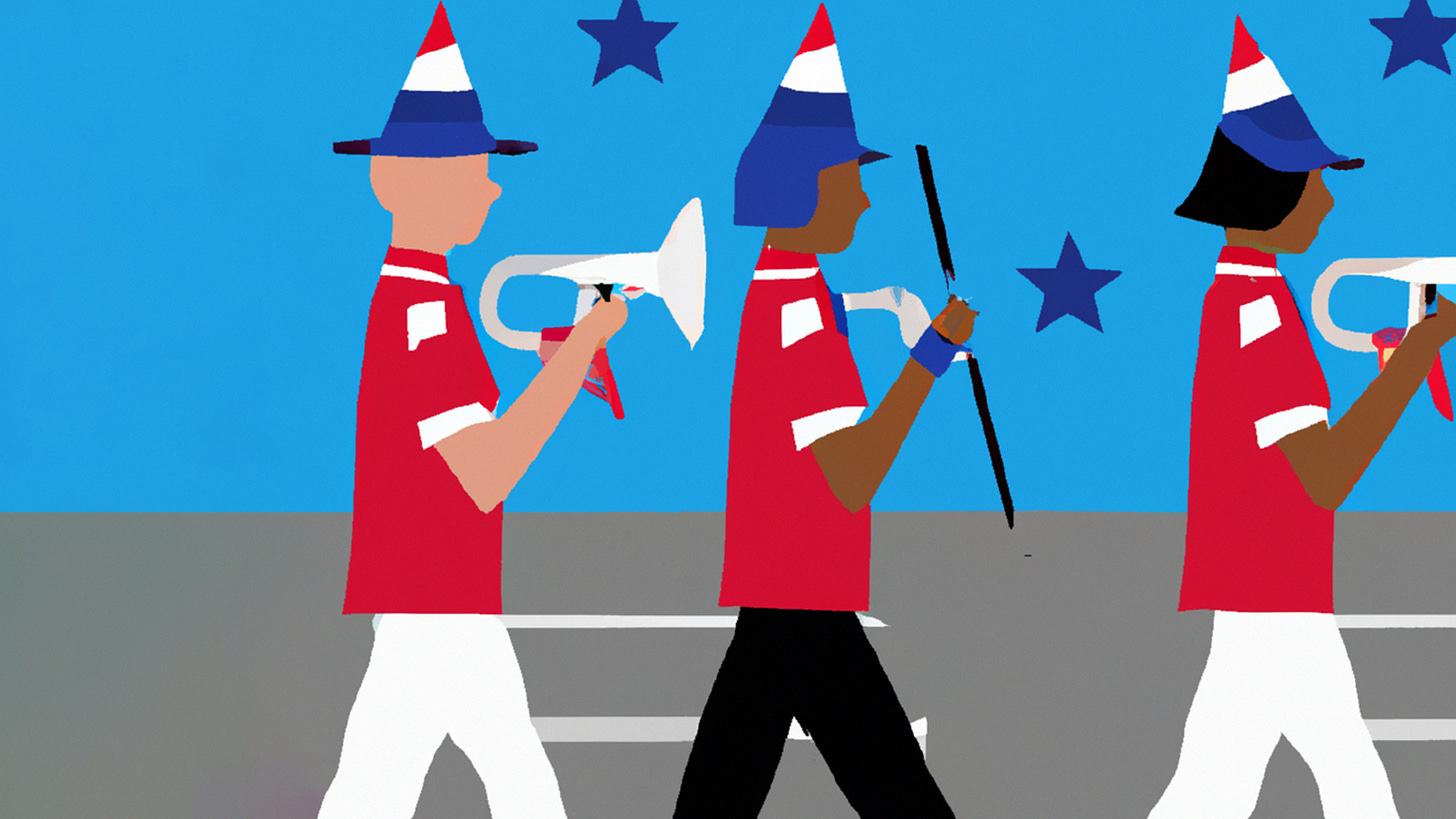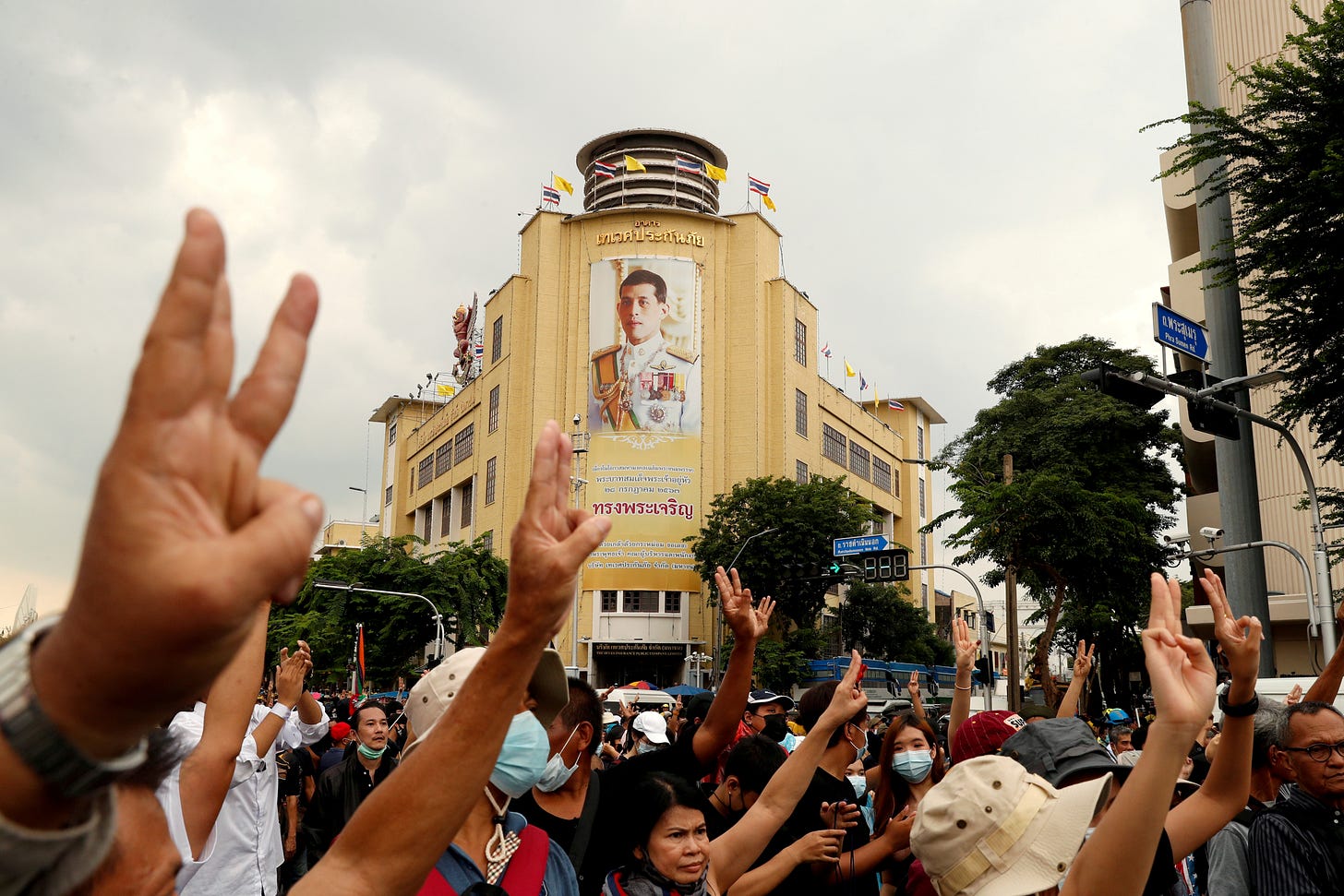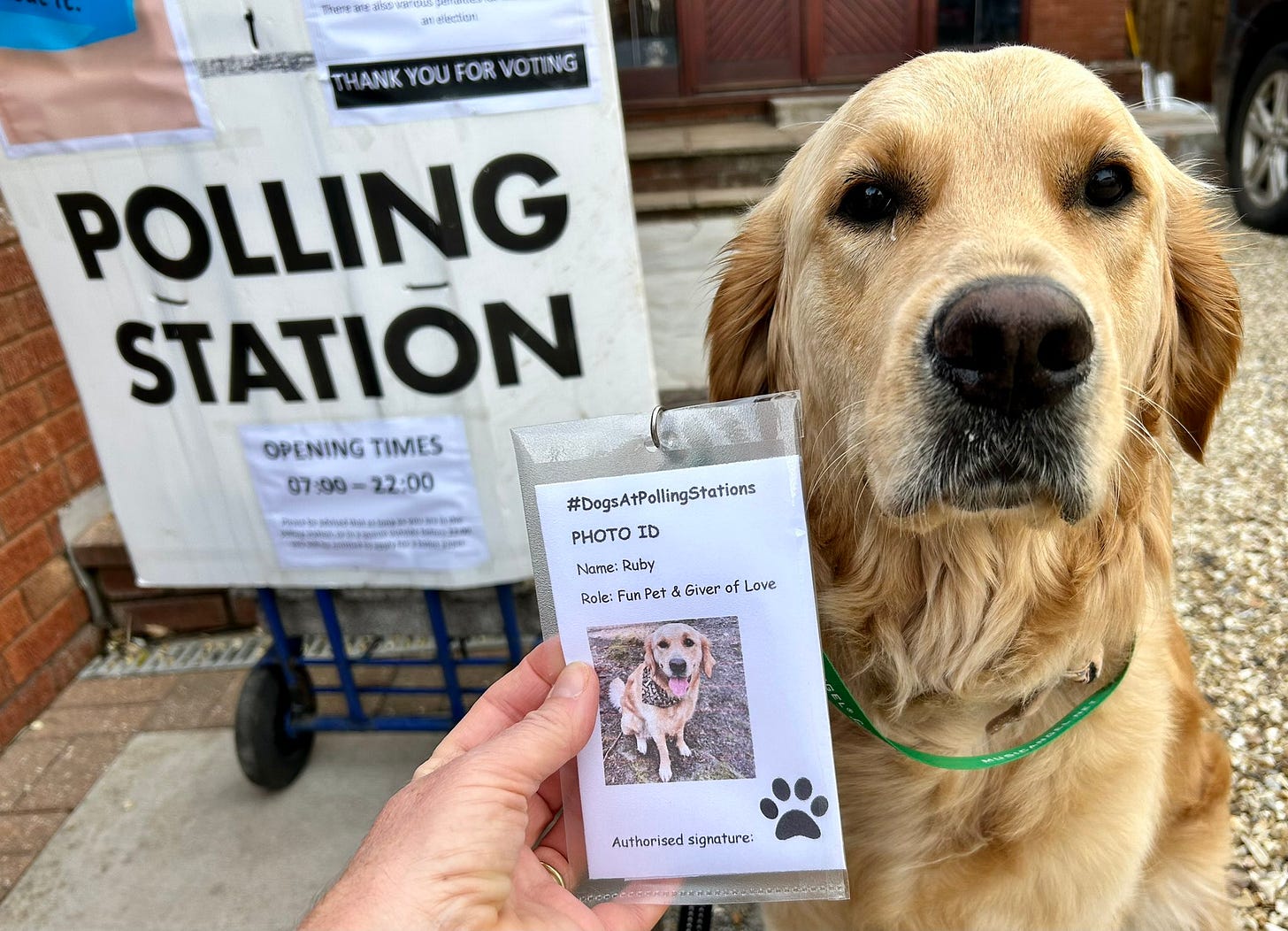The Case for Pro-Democracy Rituals
Pro-democracy movements are missing a key political tool that authoritarian movements have perfected: the power of ritual. It's time to fight back.
Thank you for reading The Garden of Forking Paths. This article is free, but if you enjoy my work, or learn something new, please consider upgrading to a paid subscription. You get access to twice as much content—and you make it possible for me to keep writing for you.
The Power of Ritual
Humans are not natural hermits. We’re group creatures, craving connection, yearning for belonging. We seek like-minded souls, hoping to become part of something greater than ourselves. It’s primal, instinctive, part of what makes us human.
That impulse runs deep within us, imprinted into our behavior over thousands and thousands of years of our ancestors engaging in a specific activity that, when done properly, produces the most powerful social glue we’ve ever known.
That glue is called ritual. It’s a binding agent, taking disparate parts—individuals—and smooshing them into a cohesive group with a sense of shared purpose and an intertwined identity.
Rituals are therefore a potent force, sometimes enlisted for good, other times not, but always able to sway us. Crucially, whether it’s religious ceremony, sporting superstition, or marking a milestone with family tradition, they make us feel good. At their finest, rituals provide one of the great joys of what it means to be human, the thrill of togetherness, a sense of unity in a world where too many feel alone.
Here’s the problem: the political right and authoritarian movements have perfected the art of the ritual. They have tapped into this ancient wisdom, harnessed it, used it to mobilize their members and fasten them together. And it works.
The political left and pro-democracy movements, by contrast, have often unilaterally disarmed, jettisoning rituals, even looking down upon them, then scratching their chins with perplexed bafflement as to why they keep losing battles that they should be winning. “We’re the party of reason,” some will say. Congratulations! But reason isn’t fun.
Secular progressives are naturally suspicious of ritual. With good reason, it must be said. They can give rise to the excesses of Granfalloon Politics. At their most pernicious, the brainwashing effects of extremists rituals—including Nazi salutes—have been used to aid and abet every worst “-ism” that our species is capable of, with hateful nationalism even culminating in genocide.
For some, then, ritual is a dirty word, associated with conformity, a tool to turn individuals with the gift of independent critical thought into groupthink lemmings. “I’ll keep my individual identity without the need for any meaningless group,” they proclaim with an aloof smugness. “Let the sheep enjoy their rituals.”
Enjoy them they do. But we should too. Rituals are not to be shunned, but celebrated. They’re fun. If we don’t satisfy our intrinsic craving for them, demagogues may swoop in and fill that void.
Let’s see how rituals work, why we need them, and how we might use them to fight back and build a more just, democratic world.
Collective Effervescence and the Sacred Trump Rally
Donald Trump is a ritualistic ringmaster. His instinct for ritual is, I suspect, an impulse emanating from the lizard-like parts of our brains, unthinking, an impulse that he follows even if he couldn’t explain why he does it or how it works.
But a Trump rally is full of sacred symbols for the disciples—and it’s an induction for the uninitiated. Sure, there are the red hats, but that’s amateur hour, entry-level. Anyone can buy one. What you really need are the secret languages, the knowing smiles when a certain word is said, a feeling that you’ve become a guardian of a hidden truth that the chumps outside will never understand.
At some rallies, the QAnon anthem is played, at which point those who know raise a single finger into the air, a symbol of loyalty to America First. There are the ritualistic displays of commissioned art, too, laced with hidden motifs and references to arcane tweets that the rest of us have long forgotten.
In fact, t-shirts are sold that say TRUMP’S TWEETS MATTER in bold letters. This is neither just a riff on Black Lives Matter nor a statement in support of free speech. Rather, for those who know, it’s an indication of sacred belief, that every typo, every rant, every act of grammatical butchery and rogue capitalization, has hidden meaning.
“The truth is right there in what the media think are his mistakes. He doesn’t make mistakes,” one Trump worshipper told Vanity Fair. Decoding them—a futile act, they’re just typos—is part of the fun.
“How many have you been to?” Trump rally attendees ask each other, a test of their devotion. The true believers have been to so many that most people would have lost count, but they never lose count. (Numbers have a special significance in Trump rallies, too; prayer meetings are sometimes held at 7:14 am and 7:14 pm by a pastor in honor of the Bible verse 2 Chronicles 7:14).
Then, the crescendo: Trump on stage, the main event, and the crowd vibrates as one.
To us, these are weird, cult-like displays. But here’s the truth: to those who attend, they’re exhilarating. Not in the fleeting way that driving a Go Kart is exhilarating, but in a much deeper way, a quasi-sacred experience that gives participants a profound sense of meaning and purpose.
The founding father of sociology, Émile Durkheim, coined the term “collective effervescence” to refer to the power of ritual. It’s a feeling of shared harmony, communal belonging, that inevitably emerges when people participate in a ritualistic act, a crowd that subsumes its members with an overwhelming sense of oneness.
The Trump rally is the most intricate and elaborate locus of collective effervescence in the MAGA movement, but it’s not alone. Consider the boat parades. (Yes, remember those?). Or CPAC. The entire political apparatus around Trump is action-oriented, ritualistic, and communal. Weird, yes, but astoundingly effective.
It’s authoritarian super glue.
Like superstition, though, rituals have no discernible causal mechanism. In other words, it’s unclear what they’re supposed to achieve or how it works. What’s supposed to happen when a MAGA member raises a finger into the air? Nobody knows. But that doesn’t matter, because the real goal—group cohesion—is achieved by the act itself.
As the anthropologist Harvey Whitehouse writes, “Rituals demarcate group identities precisely because they prescribe behaviours that are both arbitrary and instrumentally useless. They have little value except as ways of marking membership of a collective.”
Reclaiming Rituals
Humans evolved ritual because we are socially defined group animals who cooperate.
Rituals have been around since the days of Neanderthals. They provide a social function, helping us to identify fellow group members, test and maintain loyalty, facilitate cooperation, and avoid group defection, ensuring everyone sticks together.
But where are the rituals for progressives on the political left, or for the cross-party pro-democracy coalition that’s fighting Trumpism or its authoritarian cousins in other countries? Today, they’re rare, even actively shunned or attacked. That’s a mistake, because of a simple truth:
Political movements are most effective when they produce social bonds, unlocking the power of human organization particularly when the act of politics becomes intrinsically fun and rewarding.
This is not to say that we need to develop a Cult of Biden to counteract the Cult of Trump (please do not paint your truck with Biden riding an eagle in a superman outfit). Rather, we need to embrace ritual not to celebrate a man, but to celebrate ideas and values.
One of those ideas is reclaiming patriotism—not of the jingoistic variety of uncritical nationalism—but in the sense that true patriots work to forge a just society for their fellow citizens. In many countries, open embrace of the flag has become synonymous with right-wing politics. We’ve allowed true patriotism to be supplanted by the fake authoritarian version of it. And that means that people who want a sense of belonging, and derive meaning from being a proud part of a nation, often have just one option.
Rituals, then, make us human—and fighting our instinctive impulse to partake in them isn’t a wise move. Instead, let’s fight for what we care about with ritual.
The Hobbit King of Thailand and Hunger Games Resistance
Several years ago, I went to see one of the forgettable films in The Hobbit trilogy while doing research in Bangkok. The visit to the cinema was nonetheless memorable, not because of the movie, but because of the ritual before it.
Music swelled, everyone stood, and a short propaganda film was shown, a fawning biography of the (now late) Thai king. It was bewildering and blatant, a heavy-handed attempt at authoritarian political control.
Rather than rejecting ritual, though, pro-democracy Thai activists decided to adopt their own cinema-based symbol of resistance: the three finger salute from The Hunger Games. At pro-democracy rallies, students and activists alike would raise their fingers toward the sky, an act so effective that it was banned.
The lesson is clear: rituals are neither good nor bad. They’re a tool. Malicious and opportunistic political movements have long understood that rituals and symbols move us to act. Why have we forgotten that?
Among modern secular progressives, many outdated or offensive rituals have been replaced by…nothing. Other times, no attempt is even made.
Consider how modern pro-democracy protest movements in the United States differ from Vietnam-era mass resistance. Anti-war protests were a foundry of connection with like-minded souls, complete with symbols (the flower and the peace sign), rituals (draft card burning), and collective acts of creative beauty (singing protest anthems).
What are our equivalents today? What’s the anti-Trump version of the flower and peace sign? When you turn on the radio, do you hear the modern versions of Edwin Starr’s War, John Lennon’s Imagine, or the haunting Ohio by Crosby, Stills, Nash, and Young?
The modern battle between authoritarianism and democracy is too often an unfair fight, with one group perfecting exciting methods of social cohesion, capitalizing on our craving for collective effervescence, all while those who oppose them remain woefully atomized, rejecting ritual, the mechanism best suited to fight back.
The Jubilee Carport Opera and The Democracy Sausage
Last June, I attended a “Platinum Jubilee Street Party” in honor of Queen Elizabeth II ticking off 70 years on the throne. My neighbors applied for permission to close the street to traffic and organized a potluck, with an array of garden tents in the event of rain (of course it rained). I brought an obscene amount of Pimm’s.
Now, set your feelings about the monarchy aside for the sake of a good story.
There was one moment that, despite my Pimm’s-induced haze, I will never forget. It turned out one of my neighbors was, totally unbeknownst to me, a world-leading opera singer. Suddenly, she emerged, like a fully-formed incarnation of patriotic fervor, dressed in a Union Jack dress, belting out “Rule, Britannia!” from her carport, as it poured rain and her little dog wandered around at her feet searching for potluck crumbs.
Okay, so it was a little jingoistic. But what a day! I bonded more with many of my neighbors in that six hours than the rest of the year combined.
Some of you are thinking to yourselves: “That sounds fun!” or “What’s Pimm’s and how can I get some?” But others may be glowering at the screen, appalled at the idea of celebrating, shall we say, a problematic institution with a problematic song. Fair enough. (Though I will say that the street party ritual was really just about community and living in Britain; no oaths were sworn).
Similarly, when I was a kid, my parents organized 4th of July parades for the neighborhood children. We all decorated our bikes with red, white, and blue streamers as my Dad, the Grand Marshall, led the procession with a 1990s boom box blasting Sousa marches while wearing a flimsy cardboard Uncle Sam hat.
It built a sense of community. Ritual works.
I humbly submit to the skeptics that your energy is best spent not on opposing rituals that people enjoy, appointing yourself the anti-ritualistic Fun Police, but rather making sure that rituals are used to celebrate the right things: inclusive, democratic nationalism, heroic public service, and true patriotism, not the fake kind. Too often, the political left attacks problematic rituals—for good reasons—but fails to come up with alternatives that could fill that human need we all have to be part of something larger.
Throughout human history, we’ve turned to ritual to reflect our values and reinforce ideas. In the past, religion was the bastion of ritual. It still is today, for some. But for others who have no church, or who care about our civic church, we need to provide replacement rituals. In America, for example, Martin Luther King Jr. Day was a great idea (though I wish rituals around it were more widely celebrated).
The UK, for its part, has a massive missed opportunity. Public holidays are just called “Bank Holidays.” What a waste. Why not have a public competition? Rename them with public input and crowdsource ritual ideas for how to celebrate communally.
Like it or not, ritual is here to stay. In the words of the sociologists Edward Shils and Michael Young, writing way back in 1953 after the last UK royal coronation: “A society is held together by its internal agreement about the sacredness of certain fundamental moral standards…intermittent rituals bring the society repeatedly into contact with this vessel of the sacred values.”
Trump rallies have produced their own (im)moral universe of sacred symbols. It’s time we produce our own.
Australia has shown one way that ritualistic traditions can be used to bolster democracy while building communities.
I give you: The Democracy Sausage. Australia has compulsory voting—you get fined if you don’t show up—so citizens have decided to make it into a celebration. Elections are held on Saturdays, and across the country there are “sizzles,” in which people gather together and eat sausages and/or cake. There are thousands of sizzles. It’s a ritualistic celebration of being an engaged citizen.
In Britain, a new ritual has emerged around voting called “Dogs at Polling Stations.” It’s a digital ritual, of people posting images of their dogs coming with them to vote. There are costumes. There is cuteness. And it reinforces a civic identity.
Here’s one pup abiding by the UK’s recently introduced (and misguided) Voter ID laws:
As far as voting rituals go, both of these put America’s “I Voted” stickers to shame.
Democracy Doesn’t Run on Autopilot
Democracy, too often, is treated as a static feature of the status quo. That’s completely wrong. We speak of constitutions and institutions as though they have magical properties, hallowed features that will automatically endure. But ideas, institutions, and values are only as strong as the people who actively uphold them. When a democracy is under threat, as many are today, pro-democracy movements require more than the business-as-usual “I’ll do my bit and vote every few years” approach.
We need to recognize our mistake: criticizing problematic rituals should not lead to eliminating them altogether. To fight for democracy, and to reclaim patriotism and nationalism from those who make a mockery of what those concepts are supposed to mean, we need to produce new hubs of collective effervescence. And this is where studying flawed rituals rather than just condemning them is worthwhile.
The Trump Rally is not a template, but it does offer a lesson.
Sometimes, our adversaries have rather good weapons, and it’s worth understanding them, then replicating them in better ways, so it can finally be a fair fight.
After all, we’re all only human, and humans like to have fun together.
Thank you for reading The Garden of Forking Paths! As you might imagine, scouring research about rituals, pondering what this all means, and then trying to distill it for you in a way that you might find meaningful, useful, or interesting takes a fair bit of time, so please consider upgrading to a paid subscription if you value my work. I rely exclusively on your support. And please forward this on to anyone who might enjoy reading it, too.







If you have an idea for a good ritual that we should try out, I'm all ears! What should be our version of the three finger salute, or how should we co-opt the power of a Trump Rally for the forces of democracy?
What could be interesting is co-opting a popular song, where there is already a large following/audience. Taylor Swift comes to mind. There are already ’Swifty’ rituals, so a baked in audience, so to speak. Put something like that into a meme to vote, and we might see an increase in the youth vote. Just thinking out loud.